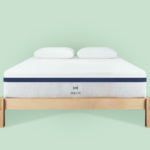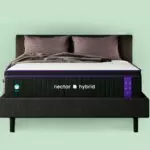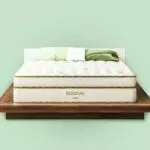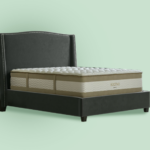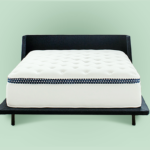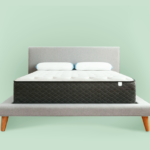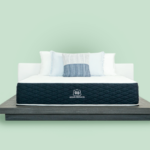Table of Contents
Your mental and physical health depends on consistently sleeping well, and a good mattress can help. Your mattress is an important part of your sleep environment, contributing to your sleep hygiene, which is the practice often recommended to improve your sleep quality.
While the best mattress can be hard to find, it’s worth the time and effort. When our Handbook Team surveyed 600 mattress owners, we found that more than 60 percent had chosen to purchase a new mattress to improve comfort, pain relief, and overall sleep quality. As a result, 73.7 percent reported improved sleep.
From our focus group
“A mattress is something you’re going to have for years and years and years. You’re also going to be sleeping on it every single night. It can literally make or break your day and how you feel whether you sleep well or not.”
If you’re looking to better your sleep with a new mattress, the Handbook Team wants you to make an informed decision and choose what’s truly best for you. To that end, we spent over 1,000 hours researching and testing the top mattresses on the market, surveying 600 mattress owners, and consulting with 21 sleep experts to compile our recommendations. Here are our picks for the best mattresses.
Best mattress overall
The Helix Midnight mattress is the best mattress overall because of its medium firmness and ideal balance between pressure relief and support. It’s also relatively affordable compared to top contenders, like Saatva and WinkBeds.
Our pick of the best mattresses
- Helix Midnight: Best overall
- Nectar Premier: Best mattress for side sleepers
- Saatva Classic: Best for back sleepers
- DreamCloud Original Foam: Best memory foam mattress
- Saatva Rx: Best mattress for back pain
- WinkBed: Best hybrid mattress
- Bear Original: Best firm mattress
- Brooklyn Bedding Signature Hybrid: Best affordable mattress
What you need to know about the best mattresses
Compare the best mattresses of 2024
|
Helix Midnight
Check Price
|
Nectar Premier
Check Price
|
Saatva Classic
Check Price
|
DreamCloud Original Foam
Check Price
|
Saatva Rx
Check Price
|
WinkBed
Check Price
|
Bear Original
Check Price
|
Brooklyn Bedding Signature Hybrid
Check Price
|
|
|---|---|---|---|---|---|---|---|---|
| Price range | $936–$1,748.80 | $1,349–$2,998 | $1,295–$2,790 | $839–$2,179 | $1,995–$3,795 | $1,149–$2,049 | $511–$1,099 | $665–$1,599 |
| Firmness | 6/10 | 6/10 | 7/10 | 6.5/10 | 6.5/10 | 6.5/10 | 8/10 | 6/10 |
| Material | Hybrid | Hybrid | Innerspring | Foam | Hybrid | Hybrid | Foam | Hybrid |
| Warranty | 10 years | Lifetime | Lifetime | Lifetime | Lifetime | Lifetime | Lifetime | 10 years |
| Trial period | 100 nights | 365 nights | 365 nights | 365 nights | 365 nights | 120 nights | 120 nights | 120 nights |
| Best For | Back and side sleepers | Back and side sleepers | Back sleepers* | All sleepers | All sleepers | Back and side sleepers* | Stomach sleepers | All sleepers |
*Based on the specific firmness we tested.
The best mattress reviews
Best mattress overall: Helix Midnight
Why we chose the Helix Midnight as the best mattress overall
We love the Helix Midnight for its balanced feel, offering contouring pressure relief from its upper foam layers and reinforcing support from its lower innerspring layer. We cut open the model we tested to see the layers for ourselves (see below).
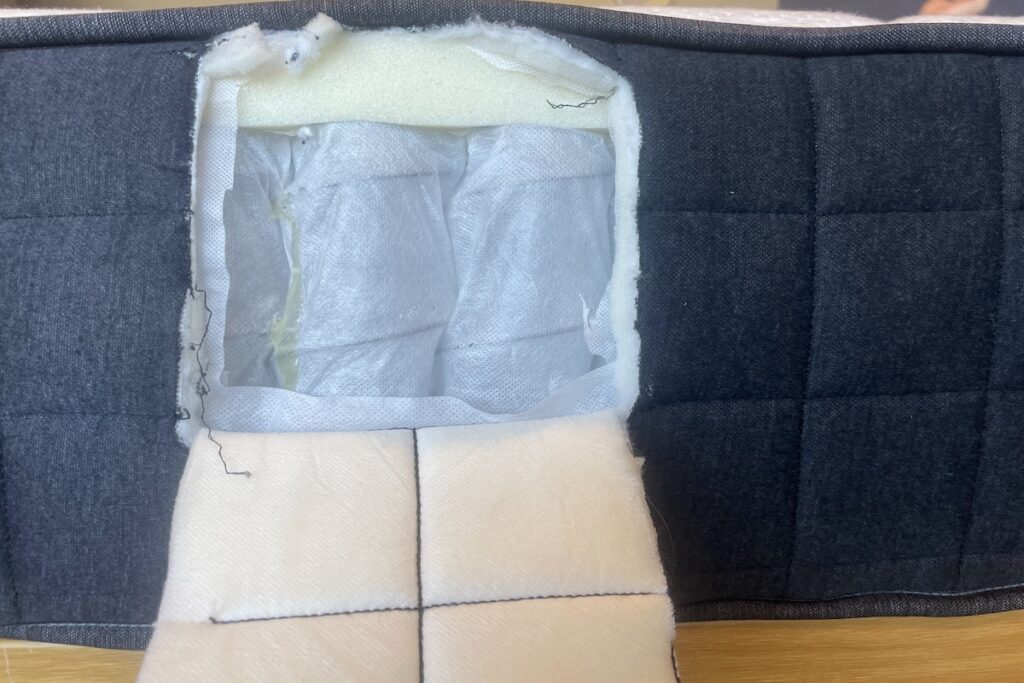
Testers agreed that the medium firmness Brands rate their mattress’s firmness on a scale from one to 10, with 10 being the firmest. and hybrid A type of mattress made with foam layers and spring layers. composition are most comfortable during side and back sleeping, and this was supported by their pressure map Our team used a pressure map to determine how well the mattress dissipates force and redistributes weight. results. The Helix Midnight supported their spines’ natural curves and dissipated sharp pressure points (like the shoulder and hip). But most testers also agreed that stomach sleepers might not enjoy the soft foam layer because it allows the hips to sink into the mattress, which isn’t comfortable on the lower back.
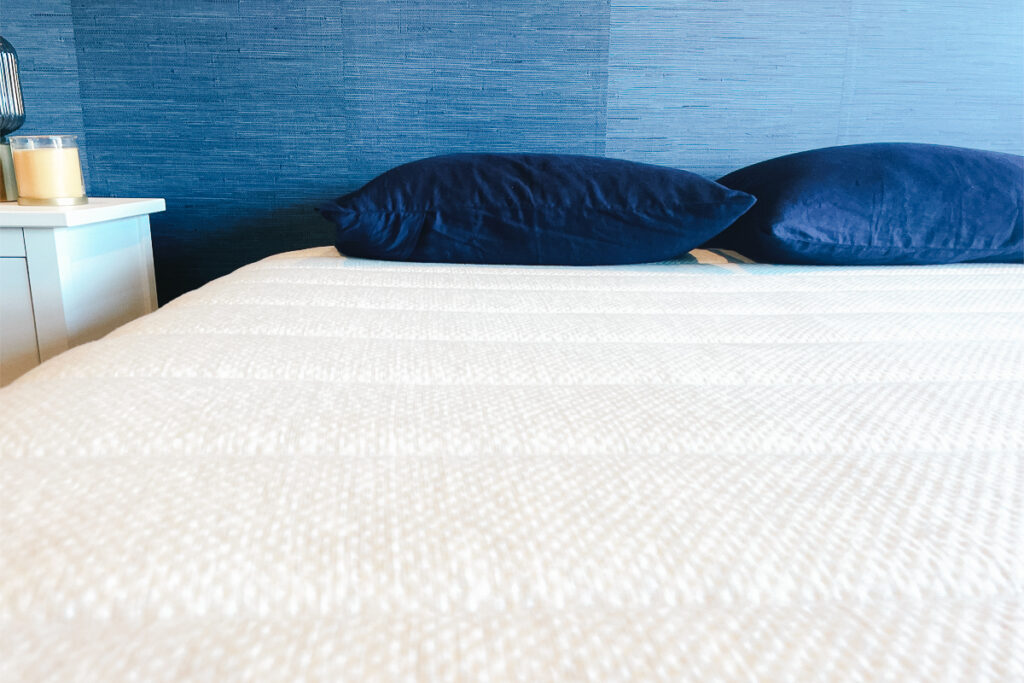
From our tester
“I love how easy it is to move on the Helix Midnight’s surface. Its responsiveness helps me switch positions, but its motion-isolating design minimizes how much movement transfers to the other side. It’s the best of both worlds.”
The Helix Midnight was also one of the best mattresses for couples. Despite having a large layer of bouncy coils, which is an enhancement during sex, the Helix Midnight has surprisingly little motion transfer from one side to another. Its individually wrapped coils and thick foam layers keep motion isolated to one region, so you can sleep soundly if your partner tosses and turns. Our team put this to the test by placing a glass of red wine on one side of the mattress while bouncing on the other. Not only did the glass remain standing, but the wine barely sloshed. That’s an impressive result for a bouncy hybrid mattress.
Best for side sleepers: Nectar Premier Hybrid
Why we chose the Nectar Premier Hybrid as the best mattress for side sleepers
Side sleepers should love the Nectar Premier Hybrid because it errs on the soft side, offers pressure relief at the hip and shoulder, and supports our midsection from sagging into the mattress. Nectar is pricier than others in this roundup, but it runs frequent promotions that drop prices by several hundred dollars.
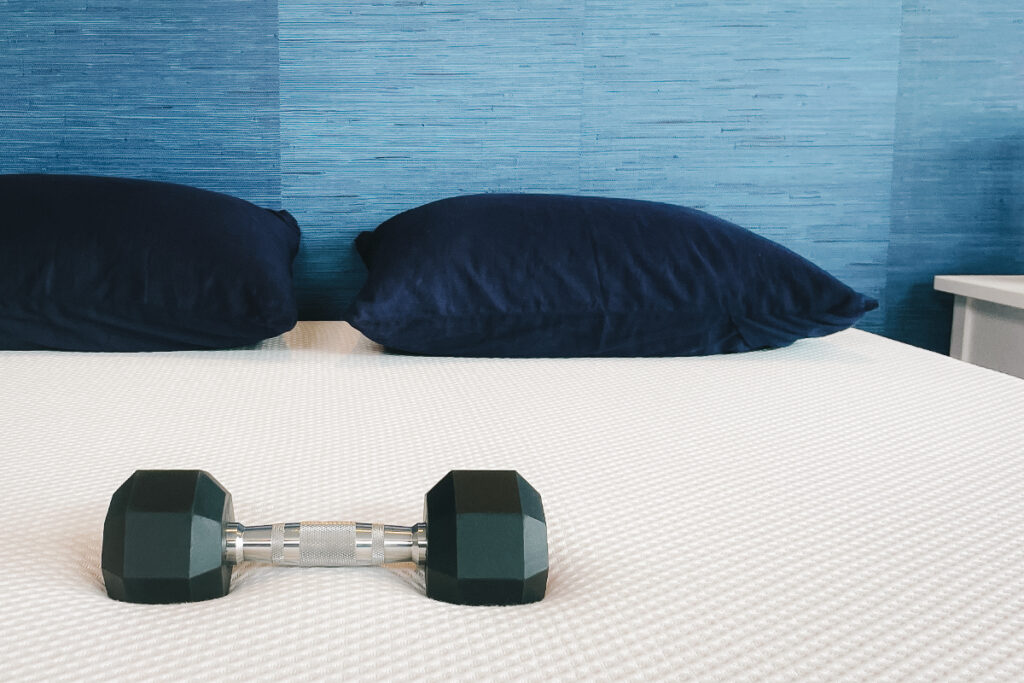
Although Nectar rates this mattress’s firmness as medium (6.5 out of 10), our team rated it slightly softer at six out of 10 due to its plush Euro Top This is a style of pillow top that’s sewn onto the mattress cover. It adds an extra layer of dense cushion. surface. Pressure map testing revealed that it’s one of the best mattresses for pressure relief at the hip and shoulder, and its spring layer offered enough under the ribcage and lower back to avoid a sagging spine. According to research, midsection support is one of the most important considerations as side sleepers shop for a mattress. Unfortunately, Nectar’s support system doesn’t perform well enough for sleepers who weigh 250 pounds or more. We’d recommend one of the best mattresses for heavy people, the Saatva HD, which offers targeted firmness under the midsection for reinforcement.
From our tester
“Both hybrid and foam Nectar Premier mattresses are great for side sleeping, but I didn’t like them for stomach sleepers because my hips sag into the mattress. However, the hybrid and foam versions performed surprisingly well in edge support, which isn’t always the case for softer mattresses. I didn’t feel like I’d fall off if I rolled toward the edge.”
To learn more, read our in-depth Nectar mattress review.
Best for back sleepers: Saatva Classic
Why we chose the Saatva Classic as the best mattress for back sleepers
The luxury firm Saatva Classic is an innerspring mattress with a medium-to-firm feel, which is ideal for back sleepers, according to research. We’ve found this true throughout our testing because medium-firmness mattresses often have a good balance of lower back support and pressure relief.
But what sets this mattress apart is its zoned lumbar support. Unlike traditional innersprings, the Saatva Classic uses a foam layer and stronger coils across the middle of the mattress to reinforce the lower back and keep the spine in a neutral position throughout the night.
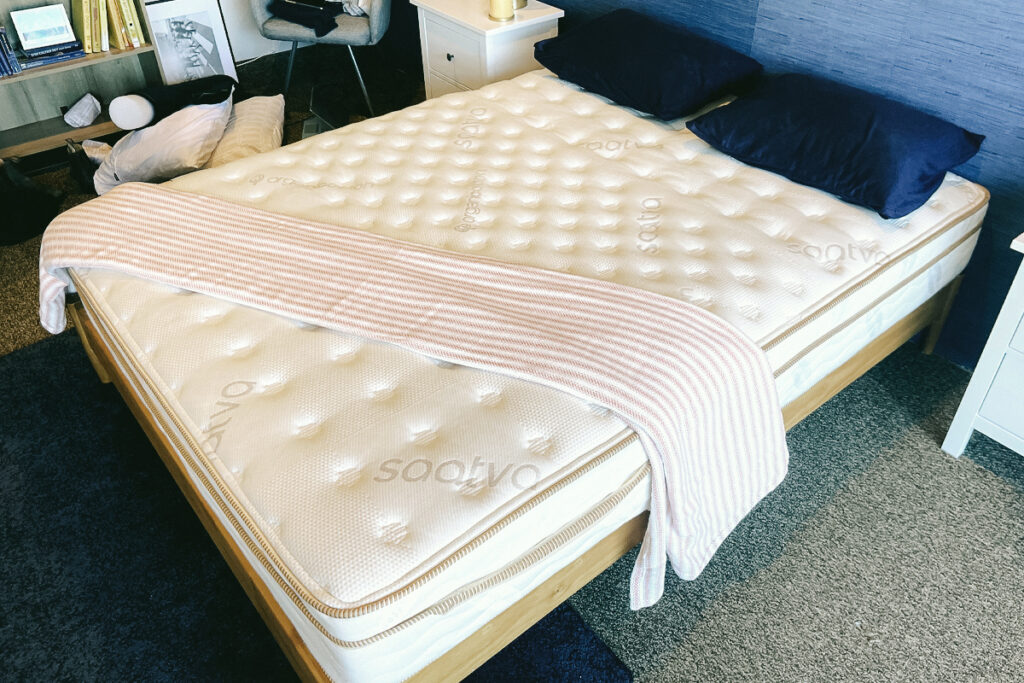
From our tester
“I’m 5 feet and 3 inches tall, so I’m on the shorter side. I needed to scoot down the mattress to make sure the lumbar support hit my lower back, not my butt. I also felt comfortable in side-lying because it supported my torso, but I think I would’ve been more comfortable with the plush soft comfort level option to offload pressure from my shoulder.”
We also recommend Saatva because of its commitment to the customer. After researching 37 brands in the industry, we found that Saatva is the only one that provides its customers with free white glove delivery, a one-year trial period, and a lifetime limited warranty for all its mattresses.
Best memory foam mattress: DreamCloud Memory Foam
Why we chose the DreamCloud as the best memory foam mattress
DreamCloud’s CertiPUR-US certified memory foam mattress outperformed other foam mattresses in multiple criteria, but the most impressive was its support. We felt how well this mattress contoured our curves to relieve pressure, but we weren’t expecting the foam to push back into our bodies at the midsection and lower back, supporting our spines the way coils do. This is an important consideration because 48.8 percent of survey respondents with a memory foam mattress listed adequate support as the main deciding factor during their search.
From our tester
“I don’t typically like all-foam mattresses because I don’t like feeling enveloped in my sleeping surface. I know some people love that feeling. But I change positions throughout the night, which isn’t easy when sleeping in a divot. I like how this mattress felt different than other foam mattresses. I didn’t feel like my whole body was falling into a deep hole, but I felt cradled, which was nice.”
We were also impressed by its motion isolation. Foam is expected to dampen movement better than the bouncy coils in innersprings and hybrids. But this mattress exceeded our expectations with a 5 out of 5 score, outperforming most other mattresses in its ability to isolate consistent movement from the other side of the bed. When our testers crawled and jumped across the mattress, we could barely feel their movement. So if you have a restless partner or cuddly pet whose movement disturbs your sleep, consider the DreamCloud Memory Foam mattress a top contender.
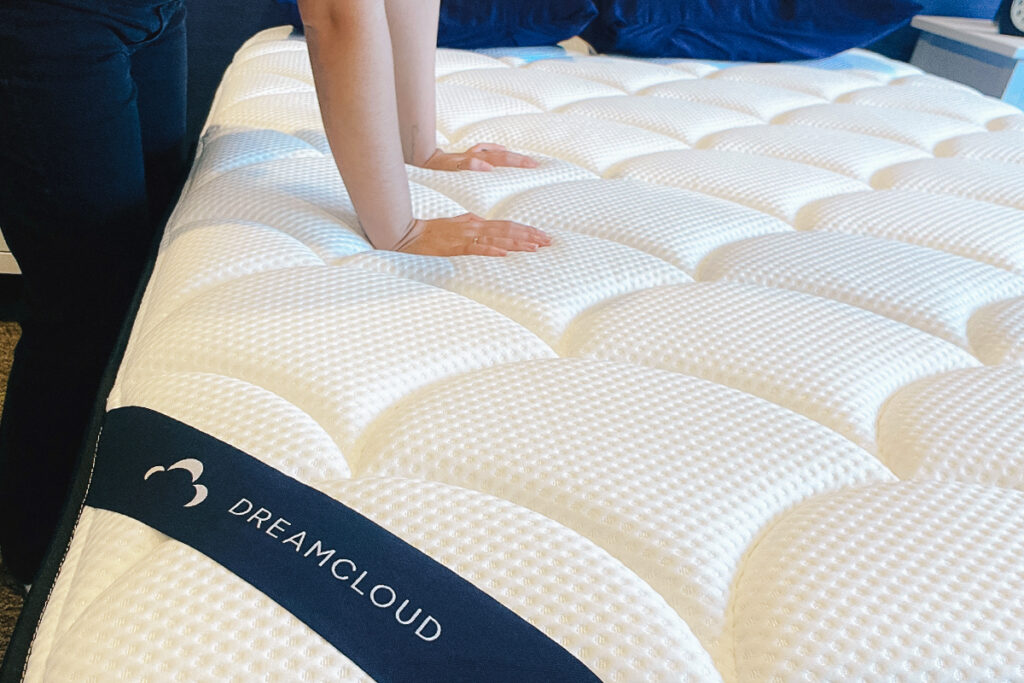
Read more in our DreamCloud mattress review.
Best mattress for back pain: Saatva Rx
Why we chose the Saatva Rx as the best mattress for back pain
If you have chronic back pain, research states that prioritizing sleep is key to recovery because it decreases your perception of pain and regulates inflammation. But getting better sleep is easier said than done, especially if back pain makes it hard to relax. According to mattress owners with back pain in our survey, 82.4 percent reported improved sleep after switching to a better mattress, and 55.9 percent reported improved mental health as a result. But first, talk to a health care professional before purchasing a mattress for back pain to ensure it fits your treatment plan.
Speak to your doctor or a physical therapist about the best mattress options before making a selection. Together, you’ll identify what type of mattress you’ll need to improve your back pain while being comfortable enough to sleep soundly.
Chelsie Rohrscheib, sleep expert and neuroscientist at Wesper in New York City, New York.
The Saatva Rx is the best mattress for people with lower back pain because it’s designed to conform to your body’s curves, reinforce a neutral spine position, and respond to your movement. Similar to the Saatva Classic, we love how this mattress offers zoned lumbar support using a targeted foam layer along the middle of the mattress. But what makes this mattress better suited for people with back pain is its foam-capped spring layer (dubbed the Therapeutic Support Core), which offers cushioned relief without more heat-trapping foam layers. We were also impressed to see how well the mattress isolated motion despite having such a thick spring layer, so the pocketed coil design does its job well.
From our tester
“This mattress was very comfortable in all sleep positions. It might be a little too firm for some people who sleep on their side, but overall offers good pressure relief. It’s also surprisingly supportive at the hips for light and average-sized stomach sleepers.”
One of our testers, a physical therapist who has treated patients with lower back pain, advised that mobility can feel very difficult on a wobbly mattress. So we appreciate how Saatva designed this mattress with enough responsiveness and edge support to help you move as easily as possible. Other testers noted that the surface was responsive to movement without much sinkage, so you don’t have to fight plush layers to get up in the morning.
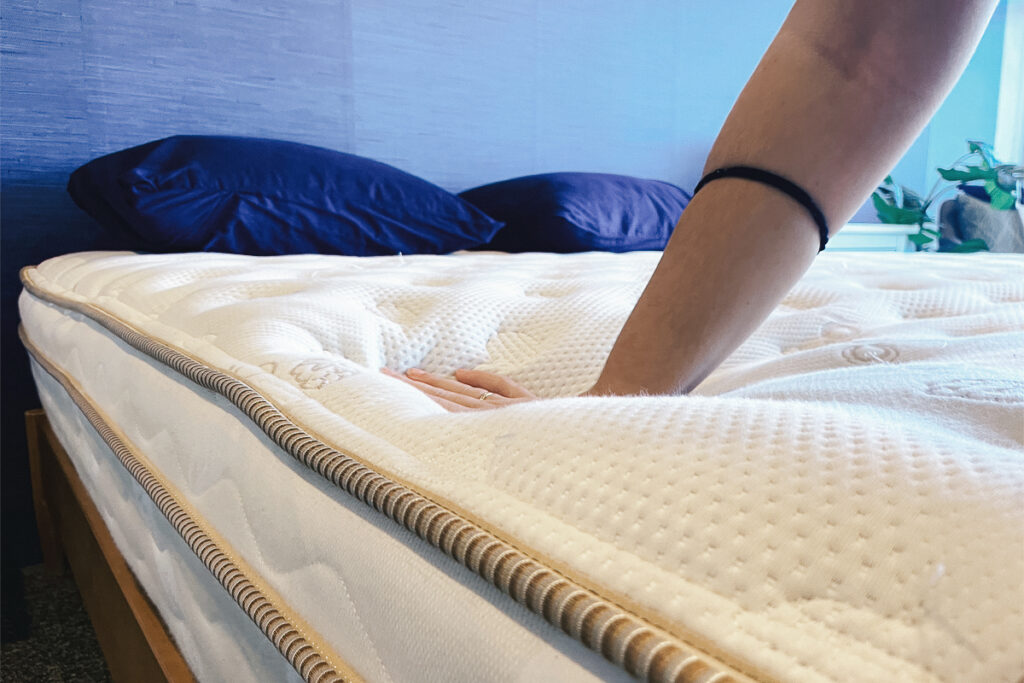
We also appreciate how safe the edges feel, so you won’t feel like you’re falling off as you push up to a seated position. Unfortunately, the Saatva Rx does lose some of its height when you sit on its edge, which could make standing feel more difficult. But it offers enough bounce to boost your movement, making up for the height loss.
Best hybrid mattress: WinkBed
Why we chose the WinkBed as the best hybrid mattress
When we tested the luxury firm (medium) WinkBed model, we loved how comfortable it was. The surface cradled our curves just enough to reveal little to no force buildup in our pressure mapping system, particularly while lying on our backs. And when we switched positions, the mattress adjusted with us thanks to the responsive and supportive pocketed coil layer underneath.
WinkBed also gets our top pick for the best hybrid mattress because it scored highly in our family subscore. A mattress is best suited for families if it has adequate surface support, edge support, cooling, and motion isolation to accommodate a pet or toddler jumping into bed with you. Despite the Winkbed having a decent bounce, its motion isolation outscored other hybrids because we could barely feel partners rolling a 10-pound ball and crawling around me.
From our tester
“I like how cool the mattress felt laying side-by-side with fellow testers. If I slept with my husband and cat next to me, I’d remain comfortable. I also felt safe close to the edge. Compared to a mattress with poor edge support, I have more surface area to use before kicking my cat—or husband—out of bed and reclaiming some territory.”
Our team also tested mattresses for sex compatibility by assessing how easily we could bounce kneeling while keeping a rhythm. This mattress scored higher than other hybrids because its thick layer of coils provides a decent bounce. Coils also allow more airflow to keep the surface cool. However, we noticed it requires more work to keep a consistent bouncing rhythm through the movement-dampening foam layers. Innerspring-dominant mattresses with firmer coils (like the Saatva Classic) assist movement better, but you’d have to sacrifice motion isolation.
![Hand running through the layers of WinkBed’s hybrid composition]](https://d1xpftaradk20j.cloudfront.net/wp-content/uploads/2024/02/WinkBed-layers-1024x683.jpg)
We recommend WinkBeds if you’re unsure which firmness level to choose because of its exchange program. If you regret your mattress choice, you can try the softer, firmer, or plus (designer for heavier people) versions for $49. Our favorite part about the program is that WinkBeds will send you the new mattress and let you compare it with your first choice for 60 days. Then, you get to choose whether you’d like to keep one or return both.
Best firm mattress: Bear Original
Why we chose the Bear Original as the best firm mattress
The Bear Original is our top choice for stomach sleepers seeking a firm surface. The three dense foam layers cushioned our body just enough to feel relaxed, but our hips didn’t feel like they were dipping into the mattress. Softer mattresses allow your hips to dip too far, causing an uncomfortable sway at the lower back. But we don’t recommend this mattress for other sleep positions—it may not be contouring enough to accommodate your body’s curves, especially if you have wider hips or shoulders.
From our tester
“I’m a frequent stomach sleeper and love this mattress for stomach sleeping. I don’t even need a pillow. It’s definitely too firm for side sleepers, though. My shoulders and hips didn’t sink into the mattress for enough pressure relief.”
Like most all-foam mattresses, the Bear Original lacked springiness and scored well in motion isolation. But we noticed how it’s more responsive than other foam mattresses we’ve tested due to its firmer feel, making it easy to reposition or get out of bed.
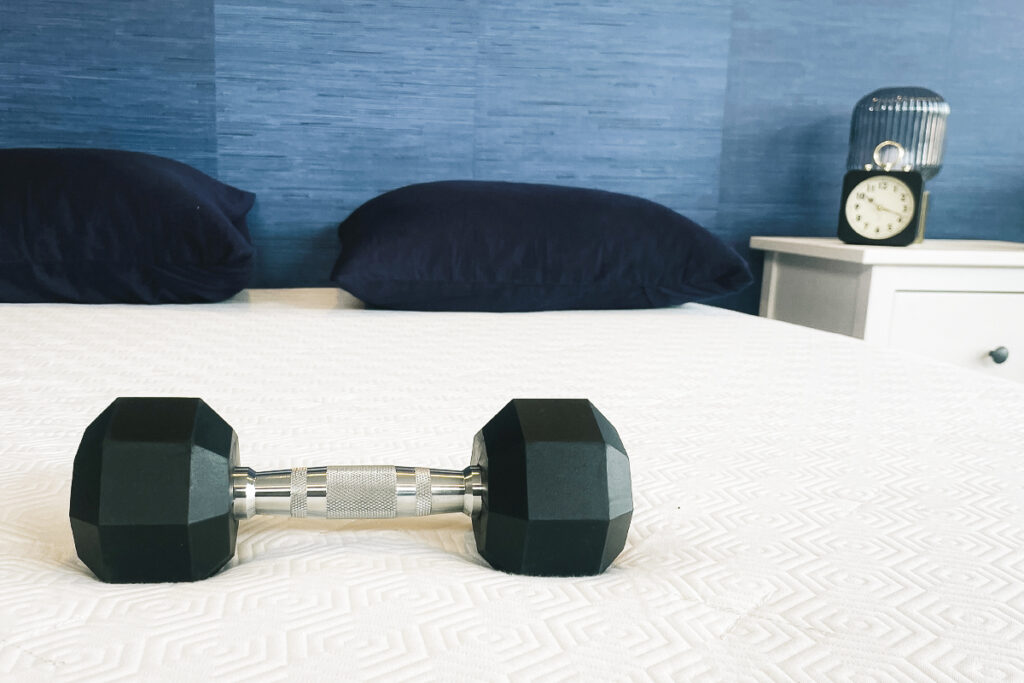
We also tested the Bear Original’s cooling capabilities, which is an important consideration since memory foam notoriously retains more heat than innerspring. To do this, we used a thermal gun to measure the temperature of the bed’s surface, laid on it for five minutes, and then remeasured the surface’s temperature to see how much heat was absorbed.
Our testing revealed that this mattress cools solo sleepers well, likely due to its heat-dissipating TENCEL A trademarked textile designed to wick moisture and cool the skin. outer cover. But when three testers laid on the mattress to mimic a couple with a dog or toddler, it scored about average. While this isn’t a bad result, a hot-sleeping couple might consider a mattress made of materials that retain less heat. We like the Bear Natural as a cooler (but slightly softer) alternative because of its hybrid composition, which promotes airflow through its coils. It also contains latex instead of memory foam, which feels cooler throughout the night.
While it’s not specifically designed for kids, the Bear Original is also a good mattress for kids. It’s affordably priced and its firm memory foam feel works well for growing children.
Best affordable mattress: Brooklyn Bedding Signature Hybrid
Why we chose the Brooklyn Bedding Signature Hybrid as the best affordable mattress
We highly recommend the medium-firmness Brooklyn Bedding Signature Hybrid for its high-quality basic composition that feels comfortable in every sleeping position. Most importantly, we love that it fits most budgets. Our survey respondents said price was a top consideration when purchasing a mattress, and most budgets were between $500–$1,000. Although Brooklyn Bedding’s regular-priced queen can exceed this range, frequent promotions drop it below $1,000.
This mattress primarily has three simple layers characteristic of a hybrid: a soft foam layer for cushion, a transition layer for compression support, and a thick coil layer for edge support and additional contour. But we found that the most comfortable aspect of this mattress was the plush quilted cover because it softened an otherwise firm mattress. Pushing through the quilted cover, the following layers felt responsive and supportive, making this mattress ideal for back and combination sleepers. We also recommend it for stomach sleepers who don’t mind a plush cover because it doesn’t sink far and keeps the spine in a neutral position.
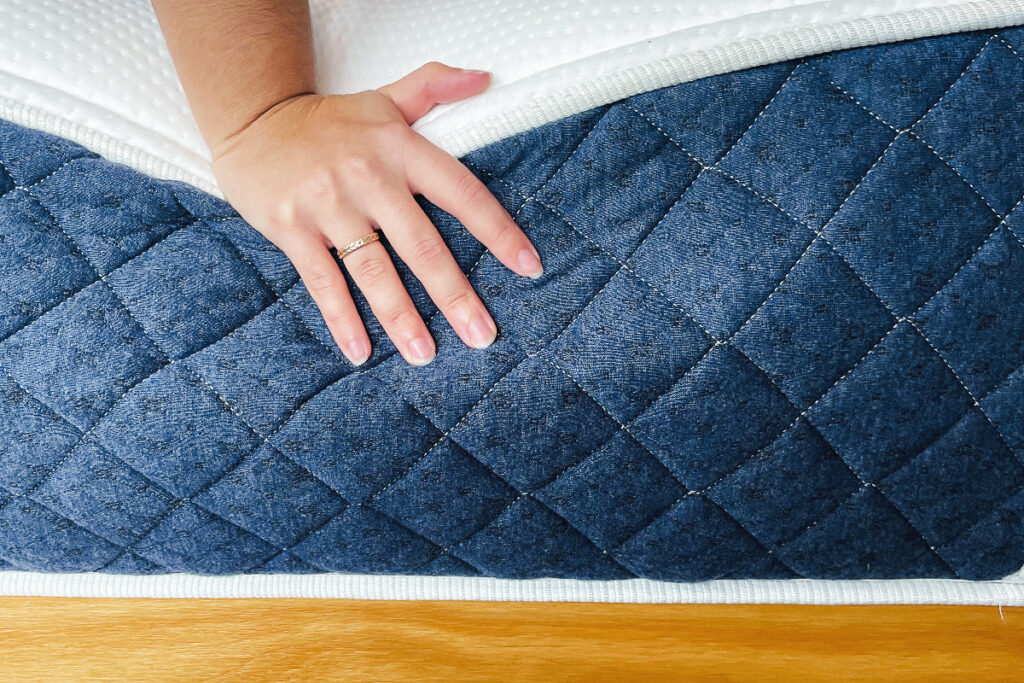
From our tester
“As someone with narrow shoulders, I didn’t mind side-lying on this mattress, but I did notice some pressure build-up on my shoulder during our pressure map testing. A side sleeper with broader shoulders or a history of shoulder pain may find themselves tossing and turning, so they should go with the softer firmness option at checkout.”
How to choose the best mattress for you
Because sleep needs and preferences vary from person to person, choosing the right mattress should be based on individual considerations. Your preferred sleep position, whether you sleep alone or with a partner, any relevant medical conditions, and of course, your comfort are all important factors to keep in mind when shopping for a new mattress. Buying the right mattress for your needs means determining what type of mattress can best support your well-being without blowing your budget. Here’s what you need to know about mattress sizes, firmness levels, and more.
Mattress firmness
Different sleep styles benefit from specific firmness ranges. Stomach sleepers tend to do well on firmer mattresses to keep the hips elevated and prevent low back strain. Back sleepers benefit from medium to medium-firm mattresses to ensure proper spinal alignment, while side sleepers need extra cushioning around the hips and shoulders to avoid pressure point pain.
Keep in mind that body weight affects how firm a mattress feels. The heavier you are, the more you’ll sink into the comfort layers and the softer a mattress may feel. So lighter sleepers may opt for softer mattresses, while heavyweight sleepers may feel more supported on firmer mattresses.
Special considerations
Mattress materials can offer specific benefits. Hot sleepers may consider hybrid or innerspring mattresses, which promote airflow better than most all-foam counterparts. Those seeking joint or pressure point relief may want a memory foam or latex mattress that offers better cushioning. Couples who are easily disturbed should opt for a mattress with great motion isolation to minimize night-time wake-ups when their partner moves.
Mattress size
Generally, more space is better, especially if you share your bed with a partner or a pet. But it’s also important to factor for bedroom size when you consider the most appropriate mattress size. Budget is also a consideration. The bigger a mattress is, the more expensive it is, and the more you’ll spend on bedding and linens as well.
Trial period
The best way to decide if a mattress suits your needs is to sleep on it, so it’s helpful to find a mattress with a reasonable sleep trial. Many mattress companies offer sleep trials between 100 and 365 days, which should give you plenty of time to test it out. Make sure you check the fine print on the return policy before you buy a mattress in the event you choose to return it.
Different mattress types
Mattresses come in various constructions, you can expect various support and firmness levels depending on the mattress type.
Hybrid
Hybrid mattresses combine comfort layers made with memory foam, polyfoam, or latex with innerspring coils. This combination promotes airflow to minimize heat retention, improves mattress durability, and offers enhanced edge support. The best hybrid mattresses offer a great balance of cushioning comfort and responsive support that appeals to a wide range of sleepers.
Memory foam
Memory foam mattresses are made with multiple foam layers designed to cradle and support the body. As a material, memory foam responds to pressure and heat to contour closely around the body’s curves, which helps eliminate pressure from building. Memory foam mattresses are associated with a “hugged” sensation that some people find really comfortable. One thing to be aware of is the possibility of heat retention. If you’re a hot sleeper, look for gel-infused memory foam and mattresses with cooling material in the cover to help minimize heat buildup.
Innerspring
Innerspring mattresses are similar to hybrid mattresses in that they combine a layer of softer materials over a coil system. But they don’t have the same ratio of comfort to support layers and often have a firmer, traditionally bouncy feel. Most modern innerspring mattresses are actually hybrid designs.
Latex
Latex mattresses offer pressure relief comparable to memory foam, but they don’t retain heat in the same way. Latex is a durable, temperature neutral material with a gentle buoyant feel. It’s incredibly responsive, so it works well for combination sleepers and those who prefer to sleep on top of their mattress instead of sinking into it. But latex layers add substantial weight to a mattress and can increase the price tag, too.
How long does a mattress last?
The average lifespan of a mattress is between 7 and 10 years. That’s dependent on details like material quality, construction type, and wear and tear. The number of sleepers who use the mattress and their body weight will also have an impact on its long-term performance and lifespan.
When is the best time to buy a new mattress?
The best time to buy a new mattress is when it’s no longer serving you. A worn-down mattress will lose its original support and pressure relief, which can become uncomfortable and lead to a bad night’s sleep. When you begin regularly waking up feeling unrested or with noticeable aches and pains, it’s time to buy a new mattress. If you’re looking for a deal, keep your eye out for promotions and sales around different holidays.
Our testing experience




The Handbook Team hand-tests every mattress we review. We evaluate brands and models by recording our findings on a 42-question standardized testing form to identify standout features and services, document issues with each product, and describe our personal experience lying on each mattress. For example, we record:
- Firmness score and whether the mattress is best for back, side, or stomach sleepers.
- Starting temperature of the mattress and how much it heats up after two testers lie on the mattress for five minutes.
- How many times a 10-pound ball bounces on the mattress after dropping from a height of 2 feet in order to arrive at a mattress bounce score.
We paid close attention to specific considerations that sleepers of all ages seek, as identified by respondents in our survey of 600 mattress owners. This included price, features, and the set-up process. We also interviewed real people to better understand the motivations behind shopping for a new mattress as well as the benefits of purchasing one.
As our testers evaluated each brand and its features, we considered why many people choose a new mattress in the first place. Of our respondents, 42 percent decided to purchase a new mattress for “improved comfort and support for better sleep,” while only 7 percent did so for “pain relief and targeted support.” The most common pain respondents wanted relieved was lower back pain.
Despite only 42 percent of respondents prioritizing comfort and support for better sleep when shopping for a new mattress, 68 percent reported they sleep longer on their new mattress and 49 percent and 45 percent, respectively, said their stress and anxiety had improved after switching to their new mattress. Almost all mattress owners we surveyed (95 percent) were at least somewhat satisfied with their new mattress. We consulted sleep experts, physical therapists, occupational therapists, and pain specialists to understand what mattresses offer that make an overwhelmingly positive impact.
According to our survey
According to our survey, about 80 percent of all respondents said their new mattress helps them sleep better, and 65 percent reported improved mental health.
In order to focus on the mattresses themselves, we structured our test designs to objectively rank each one based on a range of criteria. For example, we tested things like bounce, edge support (the sturdiness of your mattress edge), and cooling capabilities the same way on each mattress and compared the results. That way we can accurately compare each mattress’ score in an unbiased way while also sharing our subjective point of view as mattress testers and experts.
Lastly, we compared warranty lengths, trial periods, and white glove delivery (in-home delivery and setup) options. While most brands offer warranties, not all are comprehensive. And many brands on the market don’t have free white glove delivery. This could be a deal-breaker if you’re nervous to invest in a new mattress because you’re worried the bed won’t get set up properly or offer what you need.
From our tester
“During our research, we realized that the brand’s firmness scale and perceived firmness aren’t always the same. We decided to report how firm we thought the mattress felt so that you can gain a different perspective, but more importantly, feel confident about what you’re purchasing.”
About our testing
We acknowledge that every body is different, and what feels comfortable to one person may not feel comfortable to another. Throughout our reviews, we refer to weight categories as light (below 130 pounds), average (130 to 250 pounds), and heavy (above 250 pounds) to distinguish between body weights.
Typically, lighter sleepers perceive mattresses to feel firmer than they are, and higher-weight sleepers perceive mattresses to feel softer than they are. Keep in mind that most mattresses are designed for the average-weight person.
- Bolton, R., Hulshof, H., Daanen, H. A., & van Dieën, J. H. (2022). Effects of mattress support on sleeping position and low-back pain. Sleep Science and Practice, 6(1), 3. Link
- Caggiari, G., Talesa, G. R., Toro, G., Jannelli, E., Monteleone, G., & Puddu, L. (2021). What type of mattress should be chosen to avoid back pain and improve sleep quality? Review of the literature. Journal of Orthopaedics and Traumatology: Official Journal of the Italian Society of Orthopaedics and Traumatology, 22(1), 51. Link
- Haack, M., Simpson, N., Sethna, N., Kaur, S., & Mullington, J. (2020). Sleep deficiency and chronic pain: Potential underlying mechanisms and clinical implications. Neuropsychopharmacology, 45(1), 205-216. Link
- Hirshkowitz, M., Whiton, K., Albert, S. M., Alessi, C., Bruni, O., DonCarlos, L., Hazen, N., Herman, J., Adams Hillard, P. J., Katz, E. S., Kheirandish-Gozal, L., Neubauer, D. N., O’Donnell, A. E., Ohayon, M., Peever, J., Rawding, R., Sachdeva, R. C., Setters, B., Vitiello, M. V., & Ware, J. C. (2015). National Sleep Foundation’s updated sleep duration recommendations: final report. Sleep Health, 1(4), 233–243. Link
- Sletten, T. L., Weaver, M. D., Foster, R. G., Gozal, D., Klerman, E. B., Rajaratnam, S. M., Roenneberg, T., Takahashi, J. S., Turek, F. W., Vitiello, M. V., Young, M. W., & Czeisler, C. A. (2023). The importance of sleep regularity: A consensus statement of the National Sleep Foundation sleep timing and variability panel. Sleep Health, 9(6), 801-820. Link












